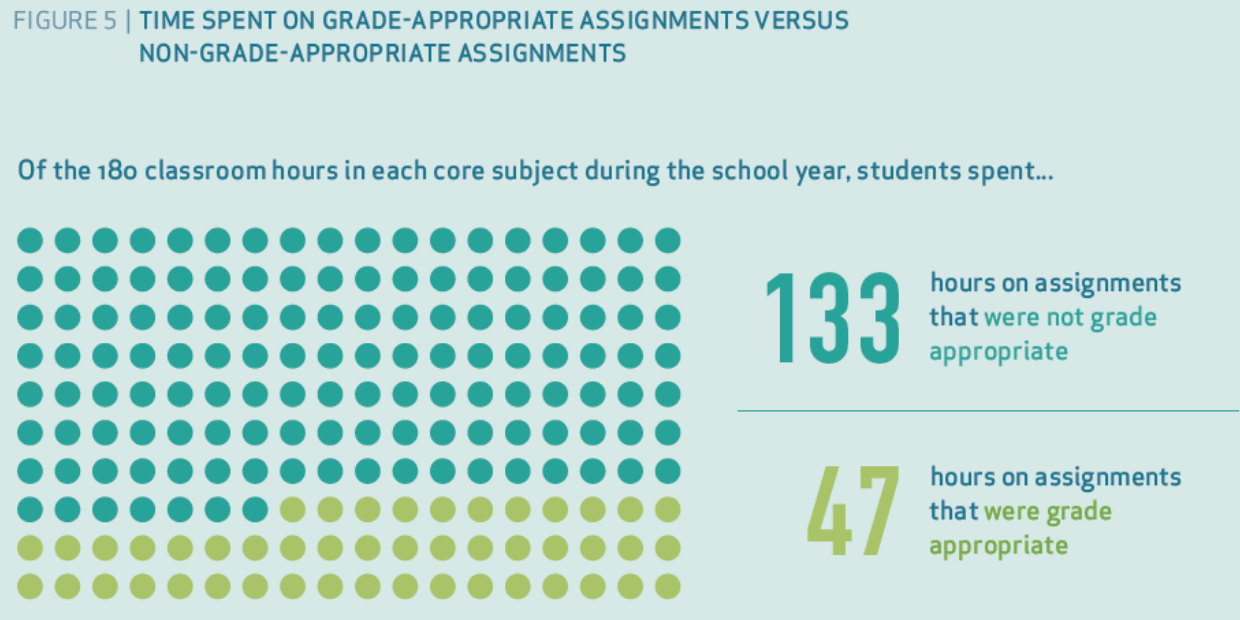
Sep 25, 2018 12:00:00 AM
by Lane Wright

 That’s a real assignment from a real eighth-grade English literacy class. When I look at stuff like this, it’s no wonder our kids aren’t ready for college. No wonder they’re not succeeding on standardized tests.
That’s a real assignment from a real eighth-grade English literacy class. When I look at stuff like this, it’s no wonder our kids aren’t ready for college. No wonder they’re not succeeding on standardized tests.
 A big cause of the problem, according to the report, is that teachers are often going it alone when it comes to finding assignments and materials to teach their students. Many times they create their own materials. The result is that only 1 in 5 assignments is aligned to the grade-level academic standards kids are supposed to be learning. It gets slightly better when they use what the district has to offer. Districts choose materials that align 38 percent of the time. That’s not good enough. When students actually got grade-level assignments and homework, it’s as if they had nearly two more months in school than their peers who didn’t. They just learned that much more. High-quality classwork is even more valuable for students who start out a year behind their peers. The data shows [pullquote]they learn, on average, 7.5 months’ worth of material more than kids who don’t have grade-level appropriate schoolwork.[/pullquote] The Opportunity Myth has been exposed. Now it’s time to bust it by giving kids what they need to thrive. They shouldn’t have to wait years for something schools could do in months.
A big cause of the problem, according to the report, is that teachers are often going it alone when it comes to finding assignments and materials to teach their students. Many times they create their own materials. The result is that only 1 in 5 assignments is aligned to the grade-level academic standards kids are supposed to be learning. It gets slightly better when they use what the district has to offer. Districts choose materials that align 38 percent of the time. That’s not good enough. When students actually got grade-level assignments and homework, it’s as if they had nearly two more months in school than their peers who didn’t. They just learned that much more. High-quality classwork is even more valuable for students who start out a year behind their peers. The data shows [pullquote]they learn, on average, 7.5 months’ worth of material more than kids who don’t have grade-level appropriate schoolwork.[/pullquote] The Opportunity Myth has been exposed. Now it’s time to bust it by giving kids what they need to thrive. They shouldn’t have to wait years for something schools could do in months.
Lane Wright is Director of Communications and Advocacy for the National Council on Teacher Quality, and formerly served as Director of Strategic Growth for Education Post and brightbeam. Lane has more than 18 years of experience in strategic communications and education advocacy. He tells stories that help families understand how their schools are doing, how to make them better, and how policy plays a role.
Few issues in education spark more tension and debate than standardized testing. Are they a tool for equity or a burden on students? A necessary check on school systems or a flawed measure of...
Charter schools are public schools with a purpose. Operating independently from traditional school districts, they're tuition-free, open to all students, and publicly funded—but with more flexibility...
Despite the benefits of a diverse teaching force, prospective teachers of color fall out of our leaky preparation pipeline at every stage: preparation, hiring, induction, and retention. Here’s what...
Ed Post is the flagship website platform of brightbeam, a 501(c3) network of education activists and influencers demanding a better education and a brighter future for every child.
© 2020-2025 brightbeam. All rights reserved.
Leave a Comment